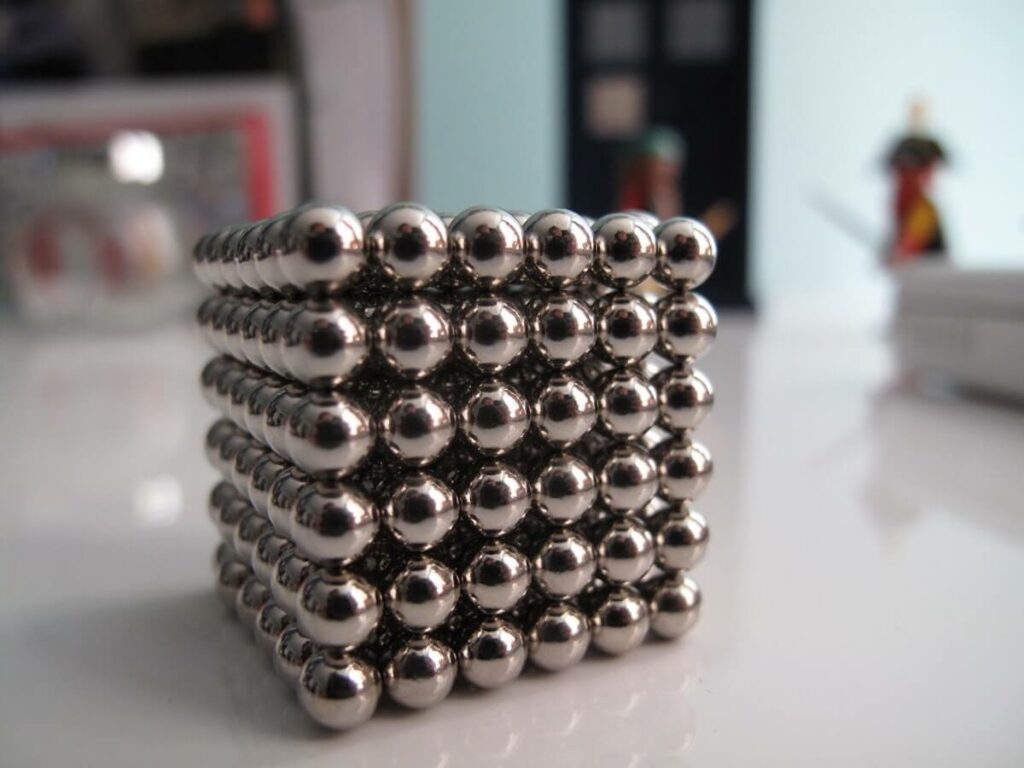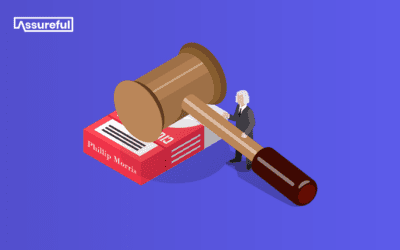Imagine this: you’re on the hunt for your next big product. One day, it hits you. An idea that’s simple, but brilliant – stackable 5mm magnets, intended to be a desk toy.
You launch your product, and it goes wild. Sales hit all-time highs day after day. In just four years, you’ve amassed a staggering $40 million in sales. Then it comes crumbling down.
This isn’t a hypothetical scenario. It’s the real-life story of Buckyballs, a perfect example of how product liability can crumble a business, bring a lawsuit down on the founder himself – and impact an entire industry.

Buckyballs: The Rise
Buckyballs, sold by the company Maxfield & Oberton, was an instant hit. The magnetic desk toys were a phenomenon and launched the company into unprecedented growth, signing up more and more retailers at every trade show they attended.
By 2011, Maxfield & Oberton’s annual Buckyballs sales reached $18 million.
But as we’ve learned from our Amazon Seller Insurance Guide, rapid growth can bring its own set of challenges. And for Buckyballs, those challenges were just around the corner.
Where Did Things Go Wrong for Buckyballs?

The first signs of trouble for Buckyballs surfaced in 2010. The CEO, Zucker, received a phone call from a sales rep informing him that one of their retailers no longer wanted to stock the magnets.
The reason?
A child had ingested two of the balls. Thankfully, the child was unharmed, but the incident raised serious product safety concerns.
A few weeks later, the Consumer Product Safety Commission (CPSC) detained a shipment of Buckyballs. The issue wasn’t the incident involving the child, but rather the warning labels on the packages.
Zucker, realizing the gravity of the situation, hired a product-safety lawyer and voluntarily began working with the CPSC to bring their products in compliance with regulations. They:
- Changed the labeling from “13+” to “14+” and included a ‘Keep away from all children!‘ warning
- Stopped selling to stores that predominantly carried children’s toys
- Issued a voluntary recall of all 175,000 units sold so far to replace the packaging (of which only 50 were actually returned)
- Participated in CPSC press releases that warned parents about the risks of the product to children
- Created an entire magnet safety website
Despite these efforts, the number of ingestion incidents began to rise. In the early part of 2012, there were 25 more reported cases than there had been in the entirety of 2011.
The most notable incidents involved Payton Bushnell, a 3-year-old from Portland, Oregon, and a boy from Louisiana. Both had ingested a significant number of Buckyballs, causing severe internal damage and requiring emergency surgery.
These incidents led a group of 14 doctors to appeal to the CPSC for a ban on these magnets, a cause that was supported by multiple state senators.
The Liability Case That Shocked the World

In the second half of 2012, the CPSC forced Buckyballs off the market, deeming the ‘desk toy’ dangerous to children.
Despite the amended packaging, warnings, and press releases, the product was still considered too risky.
By December 2012, Maxfield & Oberton had sold its remaining stock with mass discounts and was dissolved. But the story didn’t end there.
The CPSC decided to take legal action against Zucker personally – the first administrative action against any entrepreneur by the agency in 11 years.
Zucker faced two years of litigation and a threat of $57 million in penalties.
In his own words:
“This started as a side business, a way to make a couple thousand bucks. Now, I’m living a nightmare.”
In May 2014, Zucker and the CPSC reached an agreement. Zucker would hand over $375,000 to help fund the product recall, and in return, the CPSC released Zucker from any personal liability related to his products. The agreement also declared it illegal to manufacture, distribute, or sell Buckyballs in the U.S.
This case serves as a stark reminder of the very real consequences of product liability risk for eCommerce entrepreneurs. Even with the best intentions and efforts to comply with regulations, businesses can still face significant challenges in protecting their customers.
What About Other Sellers in the Market?
When the lawsuit came down on Maxfield & Oberton, it didn’t just affect Buckyballs. A number of smaller competitors were pulled into the suit, and 11 of them agreed to stop selling similar products.
Zen Magnets had a different approach.
They became the first company to be sued for a mandatory CPSC recall without any record of injury caused by their product. They battled the CPSC for over six years, with a Colorado District Court Judge eventually ‘tossing’ the CPSC’s recall decision on due process grounds after the lengthy and costly legal battle.
Want to read about more product liability cases?
- Hoverboards Blowing Up at Christmas
- The McDonald’s hot coffee lawsuit
- 3 famous product liability lawsuits
- Bullock v. Phillip Morris
- NBA Star Francisco Garcia vs Ledraplastic
Takeaways From the BuckyBall Case
We share this case not to scare eCommerce entrepreneurs, but to prompt you to consider whether your business is adequately protected – no matter how harmless you believe your products to be.
The Buckyballs case offers several important lessons for eCommerce entrepreneurs:
- The importance of having insurance that scales with you: Buckyballs went from a side hustle to a multi-million dollar business in just a few years. As your business grows, so should your insurance coverage. Our Pay As You Sell Insurance is designed to auto-scale with your business, providing the coverage you need when you need it.
- You can never fully mitigate risks: Even with careful packaging warnings, and marketing campaigns to promote proper use, there are always potential hidden risks.
- Regulatory bodies can take action: A lawsuit raised by a private individual isn’t your only concern. Regulatory bodies like the CPSC can take action into their own hands if they deem your product to be a risk or a breach of safety regulations.
- Always cooperate with regulatory bodies: Even though you have limited liability as a business owner, it’s crucial to cooperate with any action by regulatory bodies in the event of a product safety issue. The CPSC’s decision to take action against Zucker personally after his company was dissolved demonstrates the importance of making safe, considerate decisions.
The Buckyballs case is a stark reminder of the potential risks involved in eCommerce. It underscores the importance of having robust product liability insurance that can protect your business in the face of unexpected challenges.
Get automated product liability insurance with Assureful
No obligation quote.
Policies can be canceled at any time, with 30 days’ notice.




0 Comments